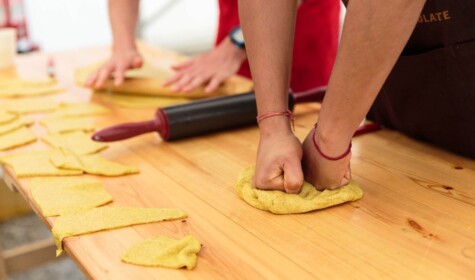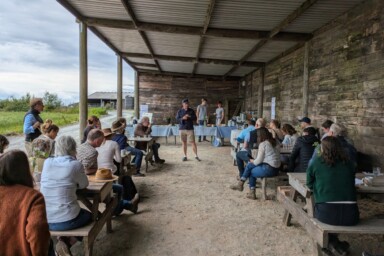Patrick Holden discusses how the centralisation of the food system has given rise to an atmosphere of paranoia about bacteria, which, in turn, is placing a disproportionate regulatory burden upon small producers and processors.
More and more of us are now recognising that the ultra-processed products of the industrialised food system, which most of us eat to some degree, are making people sick. There is also a growing conviction that we need to respond by moving towards diets which are more locally and sustainably sourced, less processed, more nutrient-rich and with a story that is known to us and that we can trust.
Yet there is a problem. Many of the smaller-scale, more local and artisan farming and food businesses, which need to find their place in the food systems of the future, are throwing in the towel. Often, this is due to the overwhelming cost of regulatory compliance, mainly in relation to environmental health, at the root of which is a connection to a societal fear of the bacterial contamination of our food.
There are, on the face of it, perfectly reasonable arguments in favour of governments and regulatory agencies clamping down on large food businesses to ensure that they maintain high hygiene standards. After all, if something went wrong, thousands or even millions of people could get sick. But what is not understood is that the burden and costs of this regulatory monitoring of big food businesses is not only unnecessary and inappropriate for their smaller counterparts, but is actually threatening to eliminate them altogether.
Ask anyone who is involved with a small-scale processing operation, especially meat processing or dairy, and they will tell you (if they dare to be honest) that they live in fear of the next inspection from the Environmental Health Officers (EHOs), whose job it is to protect the public against the risk of food contamination.
You can’t blame the inspectors and officials, they are merely acting for the Government, who themselves are paranoid about the possibility of a national food scare and the headlines it will generate. As a result, we find ourselves in an atmosphere of societal paranoia about bacteria, the fear of which is playing out throughout the country, but the policing costs of which are most severely impacting the smaller producers and processors, in other words the very businesses we most need to rebuild our broken food system.
I have just returned from an inspirational visit to Ballymaloe Cookery School in County Cork in Ireland. They organise 12-week cookery courses attracting around 60 participants from throughout the world. One of the many unique features of the cookery school is that nearly all the food, including what is eaten by the students, is sourced from the surrounding 100-acre farm and other local organic producers in the area, as a result of which the student body constitutes what one might see as a ‘feeding trial’.
Ballymaloe’s founder, Darina Allen, was telling us that at the beginning of the courses, perhaps up to a third of the 60 plus students have various dietary disorders, including a range of food intolerances, but nearly all disappear by the end of the course. She is convinced that the combination of organic production and the avoidance of all ultra-processed food, replaced in this case by the artistry of the chefs in preparing some of the best food I’ve ever tasted, is the principal reason for this transformation. By way of validation, working in conjunction with University College Cork, they have recently invited students to provide poo samples at the beginning and end of the course, which reveal a dramatic transformation of their microbiome during this period.
It hardly needs to be said that the standards of hygiene at Ballymaloe are of the highest order, but even they have their challenges; for instance, they have entirely rejected plastic chopping boards in favour of the wood alternative because they find that wood is a far safer medium, if the aim is to avoid the build-up of pathogenic bacteria. Due to their high profile and the respect, which they justifiably command in the regulatory world, Ballymaloe continues to thrive, despite, not because of, this regulatory environment.
But it is not so easy for the aspirant food processors who wish to add value to their raw materials on small family farms, and solving the epidemic fear of bacteria will not be easy. This fear of bacterial contamination is deeply embedded in our societal psyche, even though there is a parallel conversation going on about the importance of the microbiome. On the one hand, we recognise that health depends upon the body’s interaction with bacteria, and on the other hand, we feel we need to do everything possible to eliminate those bacteria from nearly all the food that we eat.
The obvious absurdity and illogicality of the juxtaposition of these two attitudes somehow seems to escape our understanding, both amongst normal citizens and policymakers. But hopefully things are changing. People like Professor Tim Spector and Chris Van Tulleken will tell us that the consequences of destroying the complexity of our previously diverse microbiome are causing a public health crisis. Food hygiene regulators don’t understand that striving towards a sterile environment can in fact create ideal conditions for ‘unfriendly’ bacteria to proliferate, owing to the eradication of other microorganisms that would usually, within a sanitary but not sterile environment, play a role in maintaining safe conditions for food handling.
Of course, we need to take bacterial contamination in food seriously, but we also need a change of attitude. The risk of litigation haunts every food producer and supermarket, resulting in many food safety measures being adopted, not because they necessarily ensure healthier, safer foods, but because the big companies are scared of getting prosecuted by their own customers!
The truth is that, for as long as there is farming and food, there will be occasions where bacterial contamination will cause problems. A key difference is that, in a local food system these incidents will be limited in their scale, whereas in a centralised system they could affect the whole population. At the consumer end, buying locally gives people more opportunity to understand how their food has been produced and the risks associated with that (for example, if buying raw milk), enabling informed choice rather than unknown risk.
Behind the struggle of small-scale producers and processors, a great deal is at stake. Ultimately, it is about our ability to buy good food from local farmers, produced in a humane and sustainable way. But it is also about the insidious process of centralisation and the corresponding fear of contamination placing huge pressure on smaller businesses within our food system.
For society as a whole, it calls into question the future story we want and need behind our food. Are we really happy to be passive participants in this industrialised system that pays little heed to the provenance of the food we eat, and that prizes sterility over taste and health? Each of us can play our part in creating a better food system by learning the truth behind what is in our shopping baskets and by recognising and celebrating those who bring local food to our tables.







